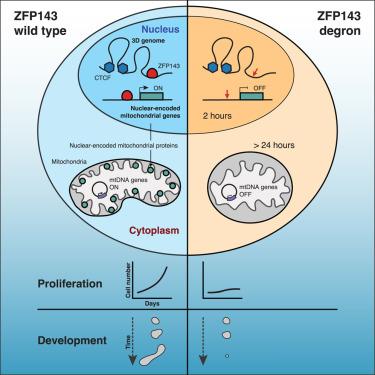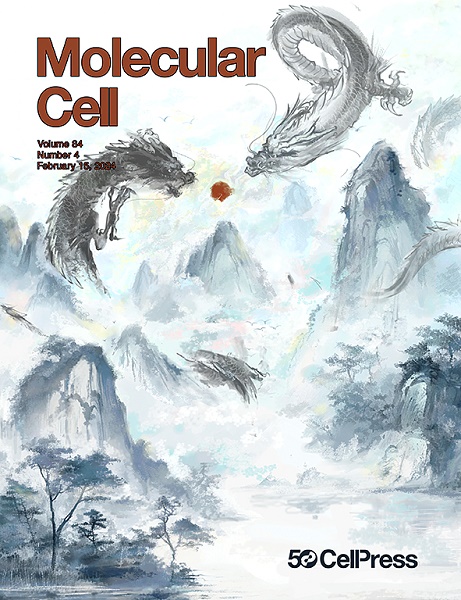ZNF143 is a transcriptional regulator of nuclear-encoded mitochondrial genes that acts independently of looping and CTCF
IF 14.5
1区 生物学
Q1 BIOCHEMISTRY & MOLECULAR BIOLOGY
引用次数: 0
Abstract
Gene expression is orchestrated by transcription factors, which function within the context of a three-dimensional genome. Zinc-finger protein 143 (ZNF143/ZFP143) is a transcription factor that has been implicated in both gene activation and chromatin looping. To study the direct consequences of ZNF143/ZFP143 loss, we generated a ZNF143/ZFP143 depletion system in mouse embryonic stem cells. Our results show that ZNF143/ZFP143 degradation has no effect on chromatin looping. Systematic analysis of ZNF143/ZFP143 occupancy data revealed that a commonly used antibody cross-reacts with CTCF, leading to its incorrect association with chromatin loops. Nevertheless, ZNF143/ZFP143 specifically activates nuclear-encoded mitochondrial genes, and its loss leads to severe mitochondrial dysfunction. Using an in vitro embryo model, we find that ZNF143/ZFP143 is an essential regulator of organismal development. Our results establish ZNF143/ZFP143 as a conserved transcriptional regulator of cell proliferation and differentiation by safeguarding mitochondrial activity.

求助全文
约1分钟内获得全文
求助全文
来源期刊

Molecular Cell
生物-生化与分子生物学
CiteScore
26.00
自引率
3.80%
发文量
389
审稿时长
1 months
期刊介绍:
Molecular Cell is a companion to Cell, the leading journal of biology and the highest-impact journal in the world. Launched in December 1997 and published monthly. Molecular Cell is dedicated to publishing cutting-edge research in molecular biology, focusing on fundamental cellular processes. The journal encompasses a wide range of topics, including DNA replication, recombination, and repair; Chromatin biology and genome organization; Transcription; RNA processing and decay; Non-coding RNA function; Translation; Protein folding, modification, and quality control; Signal transduction pathways; Cell cycle and checkpoints; Cell death; Autophagy; Metabolism.
 求助内容:
求助内容: 应助结果提醒方式:
应助结果提醒方式:


